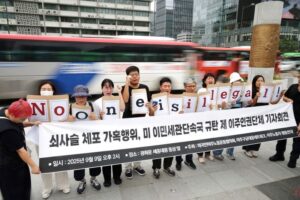RIYADH, Sept. 10 (Xinhua) — Chinese teachers working in Saudi Arabia celebrated a special occasion on Wednesday, Chinese Teachers’ Day, which is observed annually on September 10.
In a classroom at the Confucius Institute at Prince Sultan University in Riyadh, Zhang Yanfang explained the origins of Chinese Teachers’ Day to her students, while guiding them to discover the commonalities between Chinese and Arab civilizations by referencing ancient Chinese philosophers and Arab scholars.
Through Zhang’s explanation, the Saudi students were touched by the respect that Chinese people have for teachers.
During the class, the students enthusiastically expressed their heartfelt wishes to Zhang. Some wrote “Jiaoshi jie kuaile!” (Happy Teachers’ Day) in pinyin, while others carefully inscribed “Thank you, teacher” in Chinese characters. A few students added blessings in Arabic, “May you be safe, healthy, and happy forever.”
“Their sincerity reminds us why our work is meaningful,” Zhang said, touched by the scene.
For Wang Junbao, now in his second year teaching at Muammar bin Rashid Intermediate School, the Teachers’ Day carries special meaning. “When I arrived, many students struggled even to pronounce pinyin,” he recalled. “Now, they can communicate with me naturally in Chinese. Today, hearing them say ‘Happy Teachers’ Day’ was truly moving.”
Wang said that when he first arrived in Saudi Arabia, he was the only Chinese teacher at the school. Currently, however, an increasing number of Chinese teachers are moving to Saudi Arabia, reflecting the country’s growing enthusiasm for Chinese language education.
For many newly arrived teachers, their first Teachers’ Day in Saudi Arabia was equally memorable.
Ma Xiaoxia, who previously volunteered at the Confucius Institute, is now an educator in Mecca Province. She characterized the transition in her role as both challenging and fulfilling.
“Since the teaching program here is still in its early stages, we must innovate and develop our own teaching methods. It’s akin to starting from the beginning, but the students’ enthusiasm makes it a rewarding experience,” Ma said.
Echoing Ma’s feelings, Yang Liuqing, a Chinese teacher in the mountain city of Abha, described her experience as “a two-way process of teaching and personal growth.”
“To me, this is not merely about teaching Chinese,” she said. “It is also about cultural exchange. I hope education can help foster deeper understanding and establish lasting friendships between our two peoples.”
“Respecting teachers and valuing education” is a shared tradition in both countries, said Zhang Xinying, the Chinese director of the Confucius Institute at Prince Sultan University.
Teaching Chinese is not only about language, but also about building “a bridge of mutual understanding, respect, and appreciation,” Zhang added.
In recent years, Saudi Arabia has been promoting Chinese language education across the kingdom, with the goal of cultivating a new generation proficient in cross-cultural communication skills.






